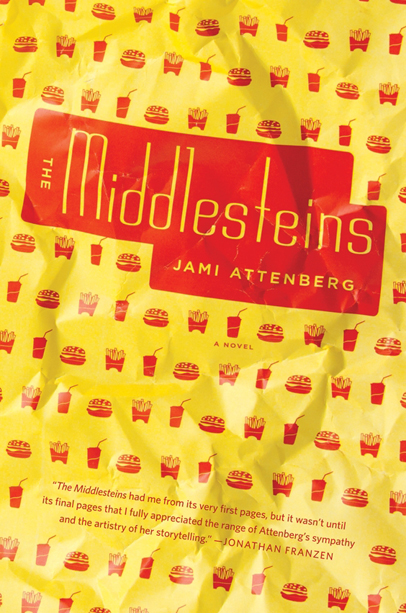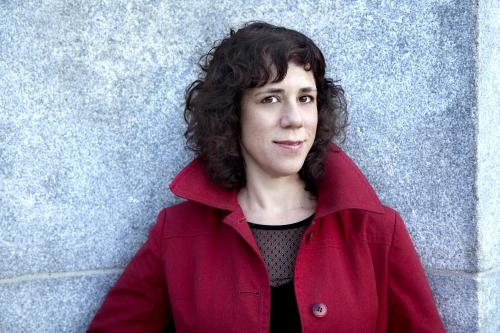
Jami Attenberg is the author of three previous works of fiction -- the short-story collection Instant Love and the novels The Kept Man and The Melting Season. She is now publishing what is poised to be her breakout novel, The Middlesteins, a multigenerational saga about the titular family and their oft-contentious relationship with food. It has picked up an endorsement from Jonathan Franzen and, among other bellwethers of acclaim, starred reviews from Publishers Weekly and Kirkus Reviews, which calls it "a sharp-tongued, sweet-natured masterpiece of Jewish family life." I spoke with Attenberg about food, family and how her publisher has broken her into the front ranks of American fiction.

What made you want to write a book about eating, family, and Judaism?
I was probably most interested in the eating component originally -- thinking about people overeating, thinking about people engaging in extreme behaviors, all kinds of vices, and thinking about my own relationship with food, which is sometimes healthy, and sometimes less so. And obviously people's relationships with food often stem from how they were raised to eat -- so often what your parents' relationship is with food informs your own, for better or for worse. So, I guess the idea of family started to come into play then. I've never written about Judaism before, so I guess I was due to start thinking about that part of my life.
But it wasn't like: let's write about these three things. It all evolved pretty organically. You write a book and after 50 pages you think it's about one thing, and then you write another hundred and you realize it's about something else and then by the time you're done you can look back and say, "Oh, this is what it's about." And even then you could be totally wrong. Just wait a while and see.

There's quite a bit in the book about American Jews' passion for Chinese food. In the course of your research, did you encounter any convincing theories (or come up with your own) explaining the connection?
I actually didn't grow up in a household that loved Chinese food particularly, and it's not really my go-to food or anything... we were more a pizza family, being from the Chicago area and all. I was just more interested in writing about the Chinese chef character in the book, who was initially inspired by a Calvin Trillin piece in the New Yorker a few years ago. While there are a few scenes set in a Chinese food restaurant, there's a lot of obsession going on with other kinds of food, too, in the book.
Can you elaborate on the role food plays in the novel for the different characters?
I'm definitely interested in how food impacts different generations of people and how their relationship evolves with it over time. I think for Edie, the matriarch of the Middlesteins who was born post-World War II into a Jewish family, she grew up in an era and a culture where food was integral to pretty much every occasion of her life. There was always a plate of food out when she was growing up, and she was always being encouraged to eat, no matter her emotional state or hunger. The end result is that she grew up with not necessarily the best coping skills or eating patterns, and a pretty complex relationship with food. And how do her habits impact her children or her grandchildren? That's just a lot of rich territory to mine.
Were there any specific influences you can name for this book?
There are so many books that I admire! And all kinds of art, music, and movies. When I was writing the book I was definitely thinking about how to make a small story feel universal, bigger than just the sum of its parts. Jonathan Franzen's The Corrections is a case study for how to accomplish this feat, obviously. Marilynne Robinson's Housekeeping has always felt like an enormous book to me, even though it is very brief. But when I actually look back to the very beginning of this process I just remember being stunned by Elizabeth Strout's Olive Kitteridge, and thinking: I would love to do a book like that about where I grew up. I appreciated the way she trusts the reader to fill in the blanks and gives us the exact amount of information we need. There's something to be said for an author who clearly respects a reader. I admire things that are layered but feel very simple, too.
You've switched publishers for this book, to Grand Central Publishing. What have the editorial and marketing processes been like this time around?
I could not be happier with my new home. In the past I was sometimes put in this women's lit category, and I was never really sure that was the appropriate place for me -- although I certainly recognize it can be helpful and correct for other people. It did feel like a mismatch, though, but I don't know if I always had clarity in the moment. I mean, I guess it's just hard to know how you are supposed to be marketed... But it shouldn't be our job anyway, I think. In theory, we should just be focused on writing good books, and then fulfill whatever opportunities our publisher creates for us -- although of course it is incredibly helpful if you have some self-promotional skills of your own. But in terms of designing and executing a marketing campaign, I'm almost positive that's the publisher's job!
But, anyway, for me to be with a publisher who has absolutely zero interest in putting me in any kind of box beyond the "read this, it's awesome" box is just incredibly refreshing. I have an amazing editor, Helen Atsma, who has been so brilliant and strategic in how she has garnered support for this book in-house, and just generally so enthusiastic about it. It was really a small book in the beginning. I'm a midlist author, and I brought with me a challenging track record, and I don't think that intimidated her one bit. So the editing process was a delight, but to see her architect an intelligent, invigorated campaign for it has pretty much blown my mind. And everyone at Grand Central that I've met, every step of the way, has just been wonderful, and they seem so invested in The Middlesteins. I don't really know what will happen with it, but I've certainly allowed myself to enjoy the ride, which I can't necessarily say I've done in the past. I'm learning you have to let yourself enjoy things more in the moment, though -- because you can never have that moment back.